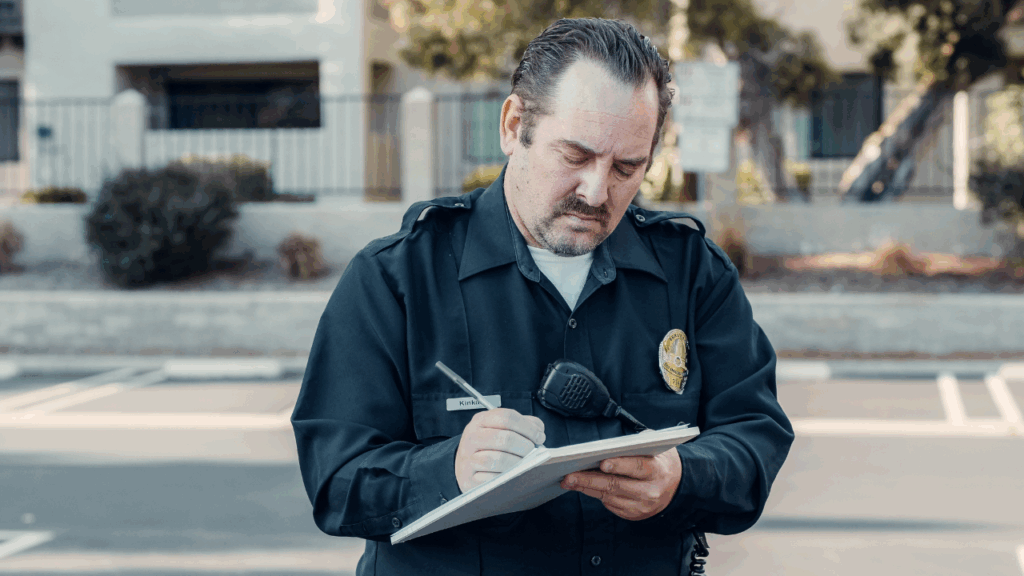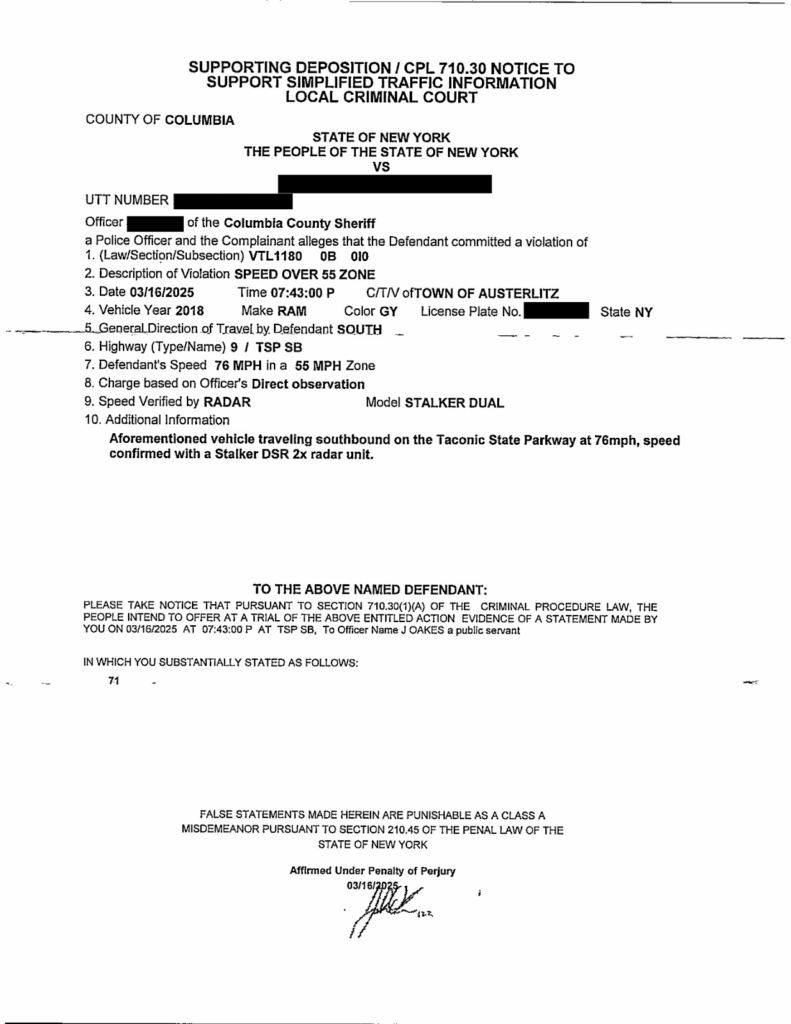
If you have been issued a speeding ticket in New York State, outside of New York City’s Traffic Violations Bureau (TVB), you may have the right to request a crucial document called a supporting deposition. This formal statement from the ticketing police officer is not just a technicality; it can play a significant role in how your case unfolds. Supporting depositions are not limited to speeding tickets, as they also apply to many other types of traffic violations under New York State law.
This article explains the importance of a supporting deposition, how you can request one, and how the supporting deposition can impact your case. Because these documents can make or break your case, it’s not something you should try to handle on your own. The experienced traffic attorneys at Rosenblum Law Firm can evaluate whether a supporting deposition opens the door to dismissal or reduction, and make sure no legal opportunities are missed.
What is a Supporting Deposition?
A supporting deposition is a written, sworn statement by the police officer who issued the speeding ticket. It sets forth the factual basis of the charge and is intended to show reasonable cause that the driver committed the alleged offense. Under NY Criminal Procedure Law §100.25, defendants have the right to request a supporting deposition if the request is made properly and within the required timeframe.
The deposition typically includes details such as:
- The reason for the traffic stop
- The date, time, and location of the stop
- Specific observations made by the officer
- The method used to determine the person was speeding (e.g., radar, pacing)
Importantly, under Criminal Procedure Law §170.30(1)(a), if a defendant submits a timely and proper request and the supporting deposition is not provided, the ticket could be subject to dismissal.
Exceptions for NYC’s Traffic Violations Bureau (TVB)
If a speeding ticket is issued within the five boroughs of New York City, the case will likely be handled by the New York City Traffic Violations Bureau (TVB), a system that operates very differently from other traffic courts in New York State.
The TVB does not provide supporting depositions before trial or allow for plea bargaining. This means defendants will not be able to request a reduced charge or negotiate a lesser penalty, as they might in other courts.
Instead, the TVB process offers no middle ground: the outcome is either full penalties or complete dismissal.
- If a defendant pleads guilty, they will be issued a fine, points on their license, or possibly even a suspension, depending on the severity of the offense.
- If they plead not guilty, the case will go to trial. There, the outcome is binary: either guilty (with full penalties) or not guilty (with the ticket dismissed entirely, including all fines and points).
Because of the strict rules, defending a ticket in the TVB requires a different strategy than in other parts of New York State.
How to Tell If You Already Received a Supporting Deposition
In many cases, police officers provide supporting depositions at the time of the traffic stop, no additional request is necessary. To determine if you received one, look for a second page handed to you along with your ticket. This document will usually include a sworn statement from the officer, detailing the reason for the stop, observations made during the stop, and the method used to determine you were speeding or committing another violation.
If you were given this page at the traffic stop, you do not need to request a supporting deposition - you already have it.
Example of a supporting deposition issued in the state of New York:

How to Request a Supporting Deposition
Under NY Criminal Procedure Law §100.25, drivers have the right to request a supporting deposition, but only if the request is made correctly and on time.
To request a supporting deposition:
- Check the designated box or circle on the traffic ticket to indicate that you are requesting a supporting deposition when entering your not guilty plea.
- In a standard New York traffic ticket, locate “SECTION B - Plea of Not Guilty” to do so.
The request must be made within 30 days of the court date listed at the bottom of the ticket and be submitted before entering a guilty plea.
Once the request is properly and timely made, the police officer is required to:
- Provide the supporting deposition within 30 days of the request, or at least five days before trial, whichever comes first.
- File a copy with the court, along with proof of service (a record showing that the document was properly delivered to the defendant).
Timely and accurate execution of this step can significantly impact how the case proceeds, so it is important to follow the process closely.
What Happens If You Don’t Receive One After Requesting It? Using a Missing Deposition as Legal Strategy
If a defendant has properly requested a supporting deposition, the police officer is legally required to provide it within 30 days of the court receiving the request, or at least five days before trial, whichever is earlier. If the officer fails to do so, the defendant may have grounds to request dismissal of the ticket.
However, dismissal is not guaranteed. A judge could deny the motion to dismiss the ticket, and once the prosecution is forced to respond, they may become less willing to offer a plea bargain.
That’s why, in many cases, it is smarter to use the missing deposition as a strategic tool in a plea bargain. Plea bargaining is the process of negotiating a reduction of the original charge. Through plea bargaining, an attorney may be able to:
- Reduce the number of points on the defendant’s license
- Lower the fine
- Avoid the unpredictability of a full trial
In many New York traffic courts (outside of NYC’s TVB system), plea bargaining is common and often more effective than taking your chances at trial. While a fine is typically still part of the plea deal, this approach offers more control and less risk than pursuing outright dismissal, which may not succeed.
Navigating this process without legal experience can backfire. An experienced attorney can help weigh the options and determine whether dismissal or negotiation is the better path based on the specifics of the case.

Need help with your speeding ticket?
Call Now - We've Fought Over 50,000 Traffic Ticket Cases
Quick, free, and no obligation.
Can You Fight a Ticket Based on the Supporting Deposition Alone?
A supporting deposition is a key component in fighting a speeding ticket in New York state, but do not count on it to automatically get a case dismissed.
If a supporting deposition is not provided after a proper and timely request, that alone may be sufficient grounds for dismissing the ticket. Additionally, if the supporting deposition is incomplete, lacks key details, or fails to establish all elements of the offense, it can be challenged in court and may result in the ticket being thrown out.
However, even when the supporting deposition does not warrant dismissal on its own, it can still play a crucial role in a speeding ticket defense. Reviewing the deposition can:
- Help anticipate what the officer will testify to at trial.
- Reveal any incriminating statements or observations made by the officer.
- Allow a defendant or their attorney to prepare appropriate counter-arguments or explanations.
In short, while the supporting deposition alone may not always win the case, it can provide critical insight into the evidence against the defendant and possibly open the door to dismissal or a reduced penalty.
To make the most of this opportunity, it is wise to consult with an experienced traffic attorney who can assess the deposition’s strength and build a tailored legal strategy around it.
Common Mistakes to Avoid
Even when someone is aware of their rights, small missteps may jeopardize their ability to dismiss or reduce their traffic ticket. Here are some of the most common mistakes and how to avoid them:
Missing the 30-day deadline
When requesting a supporting deposition, it is important to follow proper procedure to ensure the information is received before trial. To be valid, the request for a supporting deposition must be made:
- Within 30 days of the court date listed on the ticket
- Before entering a plea of guilty
As outlined in New York Criminal Procedure Law §100.25, a late or improperly timed request may be rejected, and a defendant will lose their right to use the deposition as part of their defense.
Requesting in TVB cases
If the ticket is being handled by the New York City Traffic Violations Bureau (TVB), a defendant cannot request a supporting deposition. TVB does not provide depositions before trial, so submitting a request is a waste of time and effort.
Assuming One Wasn’t Provided
Before requesting a deposition, check the paperwork. Many officers now provide the supporting deposition at the time of the stop. If there was a second page with your ticket, it is likely the deposition. Refer to the example included earlier in this article to confirm.
Failing to Follow Up or Confirm Receipt
Submitting a request for a supporting deposition is only the first step. In addition, a defendant should also be alert to whether it actually arrives. If the officer fails to provide it within the legal timeframe, the defendant may be entitled to have the ticket dismissed or use the oversight as leverage in negotiating a reduced charge. While there is no obligation to follow up, staying informed helps ensure the defendant does not miss the opportunity to act on a missed deadline.
Hire a NY Traffic Ticket Attorney
At Rosenblum Law Firm, our experienced traffic attorneys understand how to use every defensive strategy available, including the presence or absence of a supporting deposition. A speeding ticket does not have to lead to points on your license, costly fines, or increased insurance rates.
Whether it is negotiating a reduced charge, identifying legal missteps, or pursuing a full dismissal, our team will thoroughly evaluate your situation and craft a custom legal strategy designed to get you the best possible outcome. In many cases, we can even handle the matter without you ever needing to appear in court. Do not let a speeding ticket derail your driving record or finances. Call 215-602-3669 or email Rosenblum Law today for a free, no-obligation consultation about your case, and let us fight for the result you deserve.
FAQS
Can I request a supporting deposition after pleading guilty?
No. Under New York Criminal Procedure Law §100.25, a request for a supporting deposition must be made before pleading guilty and within 30 days of the court date listed on your traffic ticket. Once a defendant enters a guilty plea, they waive the right to request a supporting deposition.
Does a supporting deposition help dismiss all traffic violations?
Not necessarily. While a missing or incomplete supporting deposition can be grounds for dismissal in many New York traffic courts (outside of NYC’s TVB system), it does not guarantee dismissal of all traffic violations. Some judges may deny a motion to dismiss, and thus it may be more effective to use the issue as leverage for a plea bargain. The New York City Traffic Violations Bureau (TVB) does not provide supporting depositions before trial, so dismissal on this basis does not apply there.
What if the supporting deposition is inaccurate?
If a supporting deposition contains errors, is missing elements of the offense, or has inaccurate information, it can be challenged and may form the basis for dismissal. However, accuracy issues do not automatically void a ticket. An experienced traffic attorney can help determine whether the flaws in the deposition are significant enough to use in your defense, either to seek dismissal or to negotiate a reduced charge.


